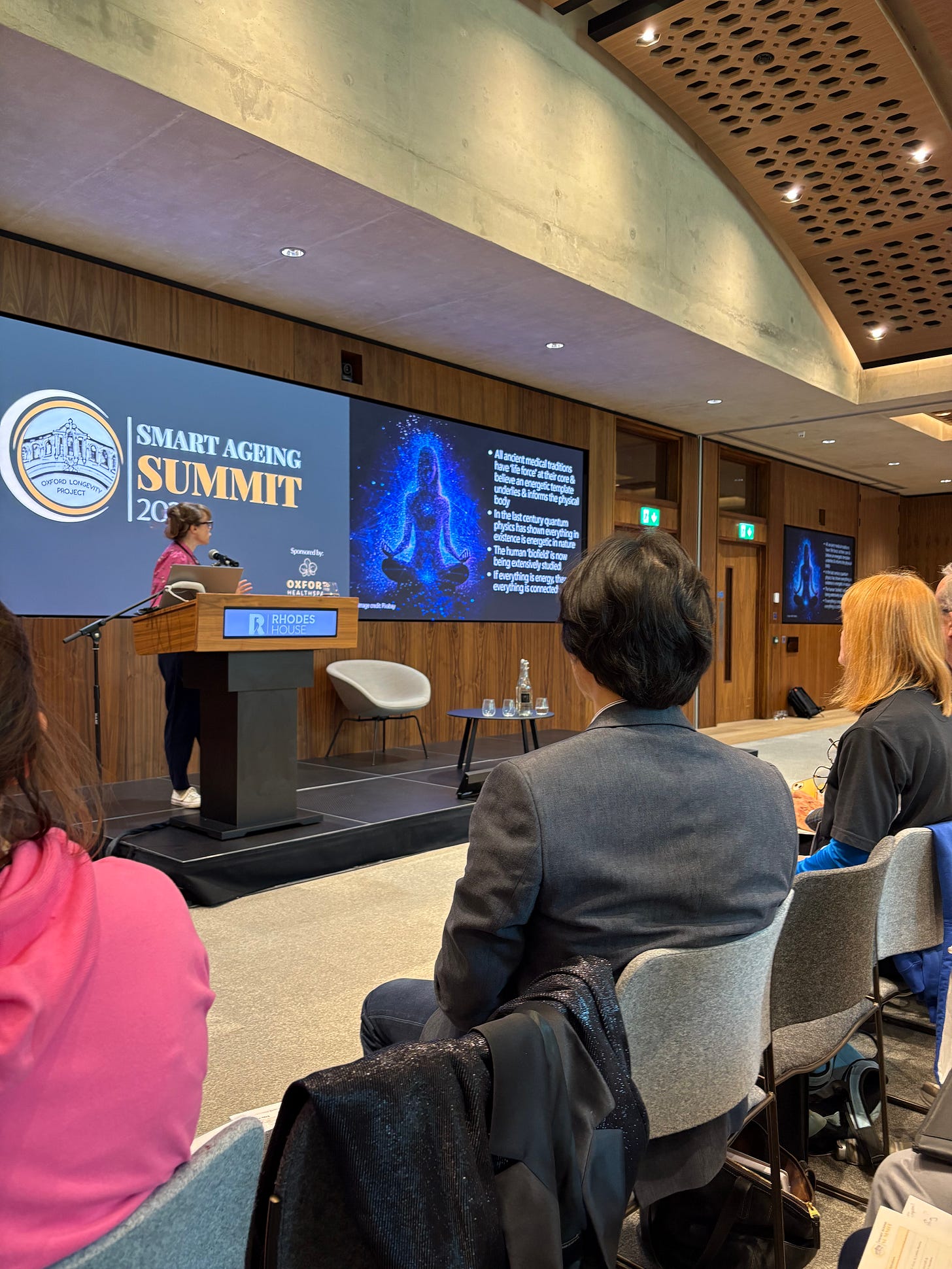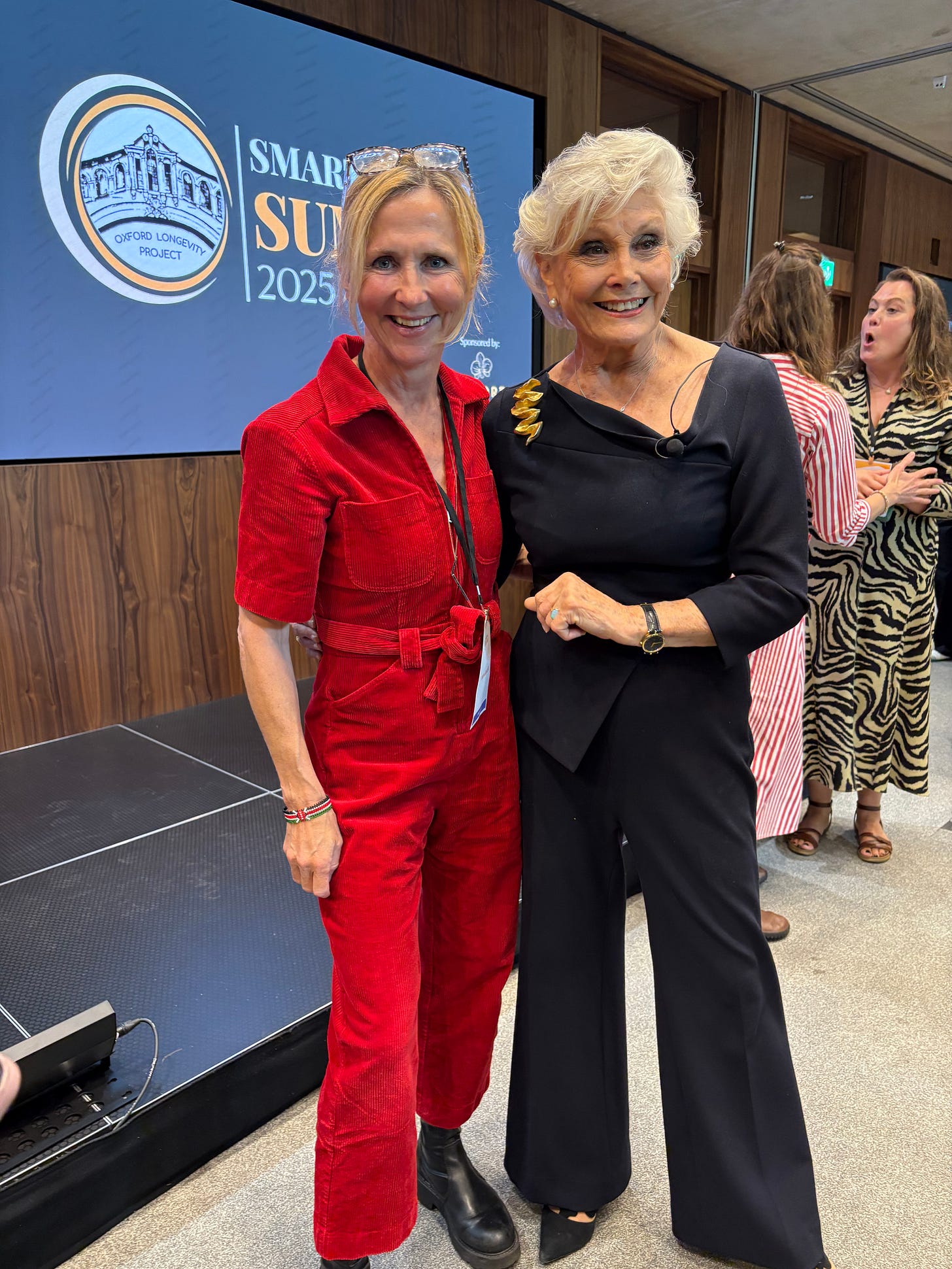Ageing, Attitude and Angela Rippon
Highlights of the Oxford Longevity Summit and secrets of ageing well
A couple of weekends ago (June 7, 2025), I had the privilege of attending the Oxford Longevity Project’s 2025 Ageing Summit at Rhodes House, Oxford. The project is a not-for-profit organisation sharing learning to get actionable, science-backed ideas around ageing to the public. And the event was anchored in science, led by proactive and positive people and gathered experts across disciplines to explore what truly builds a long, healthy life.
The focus wasn’t on biohacking, supplements, infusions and infrared saunas. It was an event that combined evidence backed and lived experience into a credible package of information and learning. And answered the question, how can we keep living until the day we die.
The pillars for a healthy life
Coming at the same question, i.e how to live well, the presenters across the day seemed to reach the same conclusions.
For me there were six foundational pillars, backed by evidence spanning clinical trials, cellular biology, epidemiology, and behavioural science:
avoid chronic stress
connect with others
move your body (walk, dance, do yoga, run)
eat well
sleep well
prioritise self‑care
It’s the holisitc approach we take at Live to Reinvent – Move with exercise, Thrive with healthy habits and self care, Restore with connection, community, breathwork, yoga – manage your stress.
Here’s some of the highlights from the day:
Let’s dance!
Broadcast icon Angela Rippon led us in a spontaneous dance to “It’s Raining Men”—a fun reminder that joyful movement engages both body and community. Angela leads the national “Let’s Dance!” initiative, launched by the NHS to promote physical and mental fitness through dance. At 80, Angela, a queen of reivention, brought the room alive and moved around the stage with the energy of a 30 year old.
Simple rules for living until you die
At 90, Sir Christopher Ball, celebrated his birthday with a 10K run. The former Chancellor at the University of Derby started running at 67, and proceeded to run 10 marathons in 10 days in his 70s.
He shared some key life lessons packaged up in easy to remember letters.
The “3 H’s” behind poor choices:
Habits (quit alcohol)
Herd (avoid following the crowd—think plant‑based in a meat-centred culture)
High (resist quick‑fix gratification)
The “MEDS” framework:
Mindset (stay positive)
Exercise (show up every day)
Diet (eat nourishing foods)
Stress (manage it mindfully)
His idylic sounding daiy routine was a gentle reminder of how living well doesn’t have to be complicated.
He starts the day with tea in bed with his wife, follows this with a ‘sauna shower’ a combo of hot-cold water. Next, he takes a barefoot walk in the garden. Then returns to bed for breakfast with his wife (as he said, a benefit of old age).
They enjoy a plant-based lunch and then fast until the following day – a new habit they formed a few months ago. Bed is 10pm, with an hour to read. Before he sleeps, he practices gratitude, by nodding off to a list from the alphabet, thank you for apples, air etc.. When he wakes in the morning he picks this up, with say, M for Morning, Mondays etc.
Sir Christopher also emphasised the importance of the three Rs:
Reconciliation (accepting life’s end with grace)
Responsibility (owning your health journey)
Regime (keep a consistent routine)
And, the three Ls:
Love (giving love keeps us young — that can be love of children, pets, social circles – it’s not exclusive to one partner
Loss (accept it, acknowledge but don’t dwell, build new connections quickly)
Loneliness (is as harmful as smoking, avoid it by staying socially active)
Clinical insights concluded common sense
Dr Wafaa Abdel‑Hadi, a researcher, educator and clincial oncologist told us she’d paired back her 83 slides to 50-something. She shared fascinating and detailed reserach and inormation, which highlighted how ageing and cancer share biological pathways. After a science packed presentation the guidance for a healthy life was the same: reduce stress, nourish the body, optimise mental clarity, prioritise sleep, and embrace fasting.
Jeremy Howick, author of Dr You, stressed loneliness was a “silent killer”, equivalent in risk to smoking, and emphasised that empathy, connection, and community are essential for longevity.
Breathwork and movement breaks
Between lectures, Jane Tarrant (breathwork specialist) guided us to tune into our diaphragm (“D‑spot”), and Wendy Welpton (movement coach) led refreshing, simple mobility drills—hip swings, calf raises—offering immediate micro‑doses of movement that kept us aler through the day.
Medicine 5.0: from passive patients to active co‑creators
The summit framed longevity through a human‑centric lens, empowering patients to co-design their path to health. As Dr Paul Ch’en noted, “an ounce of prevention is worth a pound of cure”.
At Live to Reinvent, we champion exactly this ethos providing:
individualised plans powered by AI and human coaching
foundational support across sleep, diet, alcohol management, movement, stress, connection
emphasis on joy and thriving to help keep habits sustainable
Building community and support with in person meet ups and online one to ones
By tuning into our mindset, movement, nutrition, sleep, and social world, we empower clients to proactively manage the second and third agaes, not just to live longer, but to live better.






Thanks for mentioning my contribution to the Summit last week Fiona - it really was a great day, with so many takeaways and everyone seemed to fired up. Such important messages from everyone, including my own that Every.Movement.Counts!